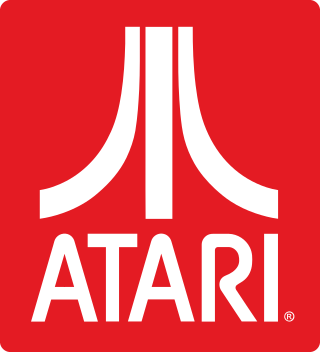Sierra Entertainment, Inc. was an American video game developer and publisher founded in 1979 by Ken and Roberta Williams. The company is known for pioneering the graphic adventure game genre, including the first such game, Mystery House. It is known for its graphical adventure game series King's Quest, Space Quest, Police Quest, Gabriel Knight, Leisure Suit Larry, and Quest for Glory, and as the original publisher of Valve's Half-Life series.

Taligent Inc. was an American software company. Based on the Pink object-oriented operating system conceived by Apple in 1988, Taligent Inc. was incorporated as an Apple/IBM partnership in 1992, and was dissolved into IBM in 1998.

A/UX is a Unix-based operating system from Apple Computer for Macintosh computers, integrated with System 7's graphical interface and application compatibility. It is Apple's first official Unix-based operating system, launched in 1988 and discontinued in 1995 with version 3.1.1. A/UX requires select 68k-based Macintosh models with an FPU and a paged memory management unit (PMMU), including the Macintosh II, SE/30, Quadra, and Centris series.

Interplay Entertainment Corp. is an American video game developer and publisher based in Los Angeles. The company was founded in 1983 as Interplay Productions by developers Brian Fargo, Jay Patel, Troy Worrell, and Rebecca Heineman, as well as investor Chris Wells. As a developer, Interplay is best known as the creator of the Fallout series and as a publisher for the Baldur's Gate and Descent series.

Broderbund Software, Inc. was an American maker of video games, educational software, and productivity tools. Broderbund is best known for the 8-bit video game hits Choplifter, Lode Runner, Karateka, and Prince of Persia, as well as The Print Shop—originally for printing signs and banners on dot matrix printers—and the Myst and Carmen Sandiego games. The company was founded in Eugene, Oregon, and moved to San Rafael, California, then later to Novato, California. Brøderbund was purchased by SoftKey in 1998.

National Instruments Corporation, doing business as NI, is an American multinational company with international operation. Headquartered in Austin, Texas, it is a producer of automated test equipment and virtual instrumentation software. Common applications include data acquisition, instrument control and machine vision. Since October 2023, NI operates as Emerson Electric's Test and Measurement business unit after getting acquired.
Star Trek is the code name that was given to a secret prototype project, running a port of Macintosh System 7 and its applications on Intel-compatible x86 personal computers. The project, starting in February 1992, was conceived in collaboration between Apple Computer, who provided the majority of engineers, and Novell, who at the time was one of the leaders of cross-platform file-servers. The plan was that Novell would market the resulting OS as a challenge to Microsoft Windows, but the project was discontinued in 1993 and never released, although components were reused in other projects. The project was named after the Star Trek science fiction franchise with the slogan "To boldly go where no Mac has gone before".

Softdisk was a software and Internet company based in Shreveport, Louisiana. Founded in 1981, its original products were disk magazines. It was affiliated and partly owned by paper magazine Softalk at founding, but survived its demise.

Kaleida Labs formed in 1991 to produce the multimedia cross-platform Kaleida Media Player and the object oriented scripting language ScriptX that was used to program its behavior. The system was aimed at the production of interactive CD ROM titles, an area of major effort in the early 1990s. When the system was delivered in 1994, it had relatively high system requirements and memory footprint, and lacked a native PowerPC version on the Mac platform. Around the same time, rapid changes in the market, especially the expansion of the World Wide Web and the Java programming language, pushed the interactive CD market into a niche role. The Kaleida platform failed to gain significant traction and the company was closed in 1996.
Timeworks Publisher was a desktop publishing (DTP) program produced by GST Software in the United Kingdom.

Spinnaker Software Corporation was a software company founded in 1982 known primarily for its line of non-curriculum based educational software, which was a major seller during the 1980s. It was founded by chairman Bill Bowman and president C. David Seuss.

Metrowerks was a company that developed software development tools for various desktop, handheld, embedded, and gaming platforms. Its flagship product, CodeWarrior, comprised an IDE, compilers, linkers, debuggers, libraries, and related tools. In 1999 it was acquired by Motorola and in 2005 it was spun-off as part of Freescale, which continues to sell these tools. In 2015, Freescale Semiconductor was absorbed into NXP.
Atari Corporation was an American manufacturer of computers and video game consoles. It was founded by Jack Tramiel on May 17, 1984, as Tramel Technology, Ltd., but then took on the Atari name less than two months later when Warner Communications sold the home computing and game console assets of Atari, Inc. to Tramiel. Its chief products were the Atari ST, Atari XE, Atari 7800, Atari Lynx and Atari Jaguar.

Quicksilver Software, Inc. was founded on May 1, 1984, by three former Mattel Electronics programmers: Bill Fisher, Stephen Roney, and Mike Breen. The company specializes in the creation of strategy, simulation, and educational products, and on focused high-technology R&D projects.
Mac gaming refers to the use of video games on Macintosh personal computers. In the 1990s, Apple computers did not attract the same level of video game development as Microsoft Windows computers due to the high popularity of Microsoft Windows and, for 3D gaming, Microsoft's DirectX technology. In recent years, the introduction of Mac OS X and support for Intel processors has eased porting of many games, including 3D games through use of OpenGL and more recently Apple's own Metal API. Virtualization technology and Boot Camp also permit the use of Windows and its games on Macintosh computers. Today, a growing number of popular games run natively on macOS, though as of early 2019, a majority still require the use of Microsoft Windows.

Piranha Games Inc. is a Canadian video game developer based in Burnaby, British Columbia. The company was founded by Russ Bullock, President and Executive Producer, and Bryan Ekman, VP and Creative Director. Piranha Games is one of the oldest game developers in the Greater Vancouver area and was housed in the International Village Mall in the Chinatown area until their relocation to their current Burnaby headquarters. On 25 November 2020, Piranha Games entered into an agreement to be acquired by Enad Global 7.
Atari, Inc. is an American subsidiary and publishing arm of Atari SA. Formed in 1993 as GT Interactive Software Corp., the video game publishing arm of GoodTimes Home Video, the company was subsequently majority acquired by Infogrames in 1999, and later renamed to Infogrames, Inc. As part of Infogrames's company-wide re-branding following its 2001 acquisition of Hasbro Interactive, which owned the rights to the Atari brand, Infogrames, Inc. became known as Atari, Inc. in May 2003. On October 11, 2008, Infogrames completed its acquisition of Atari, Inc., making it a wholly owned subsidiary.

Atari Interactive, Inc. is an American subsidiary of Atari SA, formerly known as Infogrames Entertainment SA. The company was originally founded by toy company Hasbro in 1995 as Hasbro Interactive, and was sold to Infogrames at the beginning of 2001.
InterCon Systems Corporation was founded in April 1988 by Kurt D. Baumann and Mikki Barry to produce software to connect Macintosh computers in environments that were not Macintosh-exclusive. At the time, there was no real concept of the Internet and there was still a question of whether the TCP/IP protocols or OSI protocols would be adopted widely. Over the next 9 years, the company grew from three employees to over 100 and sold software in the US, Europe and Japan.

TriGem Computer Co., Ltd., was a South Korean personal computer manufacturer and technology company. Established in 1980, TriGem was the first Korean company dedicated to manufacturing computer systems. It delivered Korea's first microcomputer in 1981 and the first Korean IBM PC compatibles in 1984. From that point until its breakup in 2010, it alternated between the first- and second-largest computer manufacturer in South Korea, competing with Samsung Electronics.












